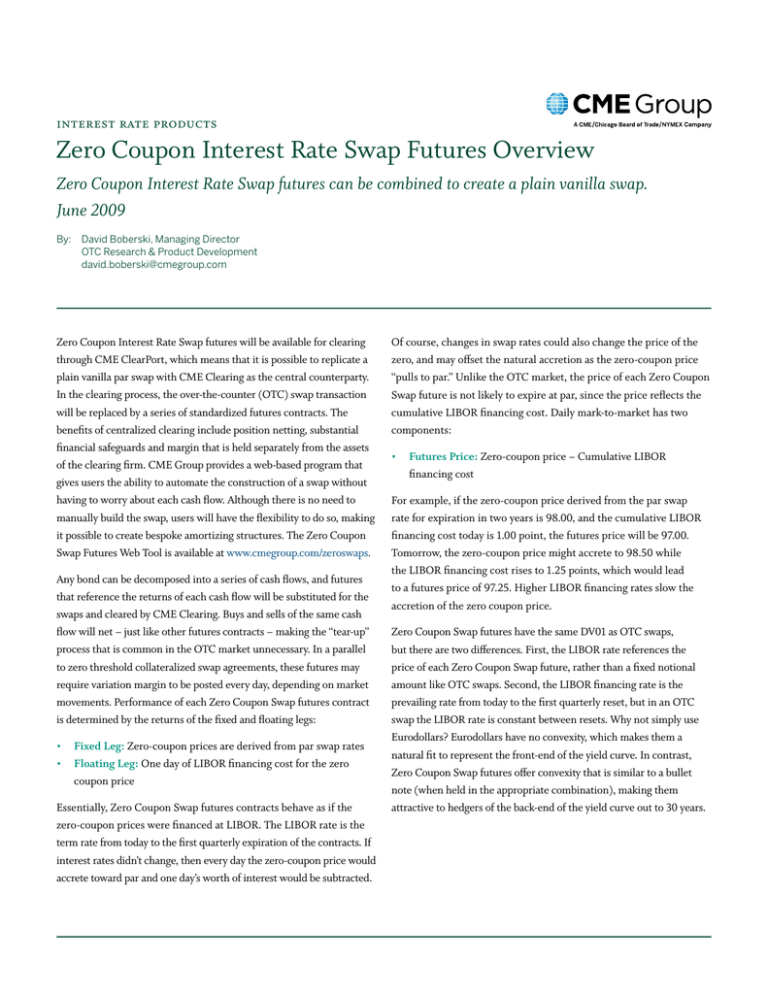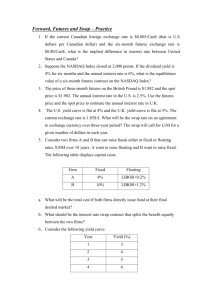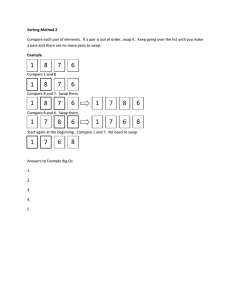
interest rate products
Zero Coupon Interest Rate Swap Futures Overview
Zero Coupon Interest Rate Swap futures can be combined to create a plain vanilla swap.
June 2009
By: David Boberski, Managing Director
OTC Research & Product Development
david.boberski@cmegroup.com
Zero Coupon Interest Rate Swap futures will be available for clearing
through CME ClearPort, which means that it is possible to replicate a
plain vanilla par swap with CME Clearing as the central counterparty.
In the clearing process, the over-the-counter (OTC) swap transaction
will be replaced by a series of standardized futures contracts. The
benefits of centralized clearing include position netting, substantial
financial safeguards and margin that is held separately from the assets
of the clearing firm. CME Group provides a web-based program that
gives users the ability to automate the construction of a swap without
having to worry about each cash flow. Although there is no need to
manually build the swap, users will have the flexibility to do so, making
it possible to create bespoke amortizing structures. The Zero Coupon
Swap Futures Web Tool is available at www.cmegroup.com/zeroswaps.
Any bond can be decomposed into a series of cash flows, and futures
that reference the returns of each cash flow will be substituted for the
swaps and cleared by CME Clearing. Buys and sells of the same cash
flow will net – just like other futures contracts – making the “tear-up”
process that is common in the OTC market unnecessary. In a parallel
to zero threshold collateralized swap agreements, these futures may
require variation margin to be posted every day, depending on market
movements. Performance of each Zero Coupon Swap futures contract
is determined by the returns of the fixed and floating legs:
• Fixed Leg: Zero-coupon prices are derived from par swap rates
• Floating Leg: One day of LIBOR financing cost for the zero
coupon price
Essentially, Zero Coupon Swap futures contracts behave as if the
zero-coupon prices were financed at LIBOR. The LIBOR rate is the
term rate from today to the first quarterly expiration of the contracts. If
interest rates didn’t change, then every day the zero-coupon price would
accrete toward par and one day’s worth of interest would be subtracted.
Of course, changes in swap rates could also change the price of the
zero, and may offset the natural accretion as the zero-coupon price
“pulls to par.” Unlike the OTC market, the price of each Zero Coupon
Swap future is not likely to expire at par, since the price reflects the
cumulative LIBOR financing cost. Daily mark-to-market has two
components:
• Futures Price: Zero-coupon price – Cumulative LIBOR
financing cost
For example, if the zero-coupon price derived from the par swap
rate for expiration in two years is 98.00, and the cumulative LIBOR
financing cost today is 1.00 point, the futures price will be 97.00.
Tomorrow, the zero-coupon price might accrete to 98.50 while
the LIBOR financing cost rises to 1.25 points, which would lead
to a futures price of 97.25. Higher LIBOR financing rates slow the
accretion of the zero coupon price.
Zero Coupon Swap futures have the same DV01 as OTC swaps,
but there are two differences. First, the LIBOR rate references the
price of each Zero Coupon Swap future, rather than a fixed notional
amount like OTC swaps. Second, the LIBOR financing rate is the
prevailing rate from today to the first quarterly reset, but in an OTC
swap the LIBOR rate is constant between resets. Why not simply use
Eurodollars? Eurodollars have no convexity, which makes them a
natural fit to represent the front-end of the yield curve. In contrast,
Zero Coupon Swap futures offer convexity that is similar to a bullet
note (when held in the appropriate combination), making them
attractive to hedgers of the back-end of the yield curve out to 30 years.
Zero Coupon Interest Rate Swap Futures
Figure 1:
LIBOR rates for the “floating” legs are determined using
Eurodollars and BBA Fixings.
Short LIBOR Rates
Figure 3:
$100MM swap with ATM rate of 1.43%.
Stub Rate
1.40
1.20
Yield %
1.00
Date
Discount Factor
Notional
Present Value
3/09
.9942
0.715 MM
0.710 MM
9/09
.9884
0.715 MM
0.710 MM
3/10
.9818
0.715 MM
0.700 MM
9/10
.9719
100.715 MM
97.880 MM
Total
0.80
100.000 MM
A. Quarterly expiration on the 15th of the month.
B. Day count is 30/360.
0.60
C. Minimum notional for each cash flow $1,000.
0.40
0.20
Do Zero coupon swap futures match the OTC market?
Characteristics
0.00
Feb 09
Mar 09
Aug 09
Figure 2:
Prices for the “fixed” leg are interpolated so that the implied
forward rates are smoothed.
Discount Factors
4.00%
0.95
3.50%
0.90
3.00%
0.85
2.50%
0.80
2.00%
0.75
1.50%
0.70
1.00%
0.65
0.50%
0.60
0.00%
4y
7y
Yield %
1.00
1y
Change Over Time
Yes
Yes
Floating Leg
Yes
No*
*Zero Coupon Swap futures act like LIBOR financed bonds, which
is better for hedging other cash bonds. LIBOR rates reference
market values, rather than a fixed notional. Prevailing LIBOR rates
to the first reset are used, rather than a 3-month rate that is fixed
between expirations.
Swap Rates
Discount Factors
Implied Forward Rates
Risk / DV01
Fixed Leg
Dec09
For more information on Zero
Coupon Interest Rate Swaps, visit
www.cmegroup.com/zeroswaps.
10y
Futures trading is not suitable for all investors, and involves the risk of loss. Futures are a leveraged investment, and because only a percentage of a contract’s value is required to trade, it is possible to lose more than the amount
of money deposited for a futures position. Therefore, traders should only use funds that they can afford to lose without affecting their lifestyles. And only a portion of those funds should be devoted to any one trade because they
cannot expect to profit on every trade.
CME Group is a trademark of CME Group Inc. The Globe logo, CME, Chicago Mercantile Exchange and Globex are trademarks of Chicago Mercantile Exchange Inc. CBOT and Chicago Board of Trade are trademarks of the Board of
Trade of the City of Chicago. NYMEX and New York Mercantile Exchange are trademarks of New York Mercantile Exchange Inc. All other trademarks are the property of their respective owners. The information within this brochure
has been compiled by CME Group for general purposes only. CME Group assumes no responsibility for any errors or omissions. Additionally, all examples in this brochure are hypothetical situations, used for explanation purposes
only, and should not be considered investment advice or the results of actual market experience. All matters pertaining to rules and specifications herein are made subject to and are superseded by official CME, CBOT and NYMEX
rules. Current rules should be consulted in all cases concerning contract specifications.
Copyright © 2009 CME Group. All rights reserved.
IR247.3/0/0709



